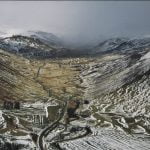We had some great news this week! We’ve pulled together £82,640 of investment to develop Regenerative Tourism experiences in the Cateran Ecomuseum.
Regenerative Tourism encourages people to rethink how they travel for leisure and how they enjoy the places they choose to travel to in ways that ‘leave things better’ and ensure those places are available for future generations to enjoy.
 Photo, Markus Stitz
Photo, Markus Stitz
Sustainable Tourism, the current mainstream concept, tends to focus on reducing the negative impacts of tourism – it’s sustainable as long as it doesn’t make a place worse. Regenerative Tourism practices on the other hand aim to replenish and restore what we’ve lost, destroyed or degraded by helping to build communities that thrive, while allowing the planet to thrive too.
Even pre COVID, there was growing recognition that mass international tourism, based on an industrial operating model, was producing diminishing returns for providers and host communities; overcrowding destinations; placing excessive pressure on scarce resources of land, water and energy; failing to take sufficient responsibility for managing and minimizing its waste or preserving the environmental and cultural resources on which it depends.
COVID’s impact has served to underline the fragility and lack of resilience of most tourism businesses and the economies of the communities which are dependent on it and the context of not only COVID and likely future pandemics, but the even bigger crises of global heating and biodiversity loss as well, make it imperative that we develop a form of tourism that is more resilient, delivering tangible and equitable benefit to host communities whilst enabling the planet to flourish too.
We believe Regenerative Tourism offers this and our aim is grow a Regenerative Tourism approach across the Ecomuseum.
 Photo, Clare Cooper
Photo, Clare Cooper
This latest project called ‘Travel for All Our Tomorrows’ will develop a second stage of heritage-based walking and cycling itineraries across our geography, which encompasses eastern Perthshire and western Angus. So called ‘Active Travel’, which encompasses walking and cycling, is regenerative because it reduces carbon footprint, places less pressure on the environmental resources of host communities and replenishes and restores people’s physical and mental wellbeing. The investment, which has come from Paths for All, the Cairngorms National Park, NatureScot and Perth & Kinross Council, together with the Cateran Ecomuseum’s own Directors will also allow us to kickstart a campaign to position the Ecomuseum as one of Scotland’s premier car-free holiday destinations.
We will be working with local communities and businesses in the Ecomuseum area during 2021, to co-design and promote nine new self-guided and guided cycling and walking itineraries for all abilities, one new family friendly cycling event and one new temporary outdoor arts installation, not dissimilar in ambition to the Martin McGuinness’s great Hamish Henderson portrait which formed part of our launch programme just over a year ago. These, together with the Ecomuseum’s existing walking and cycling itineraries, will be shared through new digital and printed information on how to get to and around the Ecomuseum car-free and three short films.
 Photo, Markus Stitz
Photo, Markus Stitz
The cycling itineraries will be designed by Markus Stitz of Bikepacking Scotland, who has successfully worked with other destinations in Scotland to develop cycling routes, most recently in the neighbouring Highland Perthshire region. “I am looking forward to working with the Cateran Ecomuseum on this forward-thinking project. Cycling is a key driver to establish a more sustainable, regenerative approach to tourism in Scotland, driven by working actively with local stakeholders, can provide activities that have very low impact on the environment and add a long-term income stream to the local economy. Scotland is a land with incredible natural assets and a rich history, and Bikepacking Scotland’s vision is to provide people with ideas to harvest this potential.”
Graham McQueen, Smarter Choices Smarter Places Open-Fund Senior Development Officer, said “Paths for All have invested 50% of the cost of the Travel for All Our Tomorrows project and we are really excited to see how this innovative project progresses. Smarter Choices Smarter Places is all about creating a modal shift from cars to more sustainable forms of transport and it’s great to see such a sustainable, environmentally friendly approach to tourism contributing to this modal shift.”
Pete Crane, Head of Visitor Services for the Cairngorms National Park, said “The latest Cairngorms National Park visitor survey shows that 57% of our visitors – that’s 1.2 million people each year – want to enjoy a low level walk with great things to experience, with well over a quarter of a million enjoying a bike ride. This project offers so much for visitors; the chance to safely, responsibly and slowly enjoy the amazing culture of Cateran Country and the southern Cairngorms in a way that brings our heritage to life. A great way to explore one of the quieter parts of the Highlands, along with the chance to meet and chat with those of us who live here and want to share our love of this amazing place.”
 Photo, Markus Stitz
Photo, Markus Stitz
Janet Hunter, one of the Directors of the Cateran Ecomuseum, said “We’re very pleased to have been able to put together such a sizeable budget for Active Travel in the Ecomuseum and very grateful to our funders, especially given the very difficult context of the Pandemic. This investment builds on what we have already achieved during our launch phase and gives us an opportunity to grow our innovative Regenerative Tourism approach. We want people to explore the Cateran Ecomuseum on foot and by bike, travelling slowly so that they can take in the amazing landscape and discover the extraordinary heritage and stories along the way, and we want them to really get to know our host communities and all they have to offer. We’re also looking forward to building relationships with public and private transport providers to enable people to travel to the Ecomuseum car free much more easily. We are delighted that our community ambition to promote healthy, climate conscious experiences for everyone is being recognised and I’m looking forward to trying out all the new routes.”

